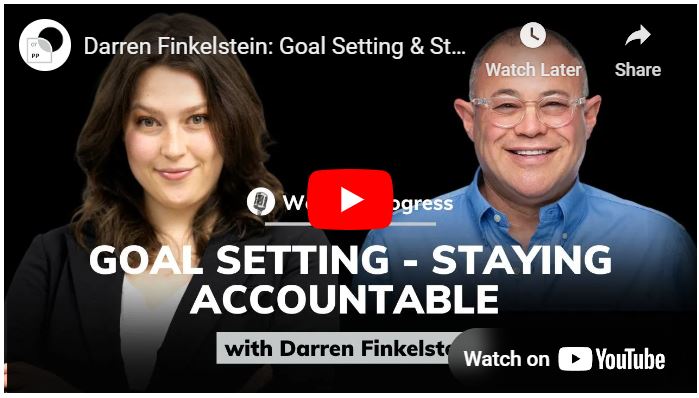Many businesses struggle to explain in simple terms what makes them different. Often, cluttered messaging or vague statements bury that small but powerful edge—the reason a customer chooses you over someone else. That’s why developing a strong Unique Value Proposition (UVP) matters. A UVP speaks clearly and directly about how your offer solves a specific problem, how it’s different from others, and why that difference matters. It’s not just a tagline or slogan. It’s about the promise you stand by and the reason people should care.
Discover your Accountability Score and increase the probability of smashing your GOALS and Getting Sh!t Done!
Alongside that, your market position acts as your flag in the ground. It determines how people perceive your business in comparison to others engaged in similar activities. While your UVP is what sets you apart, your market position brings structure to your reputation. Together, these two things shape how your business shows up in the minds of customers, clients, and stakeholders. Getting them right can make a major difference when working with an entrepreneurship coach. It brings clarity, direction, and sharp focus to your efforts.
Understanding Unique Value Proposition (UVP)
A Unique Value Proposition (UVP) is a clear statement that describes what your product or service does, who it’s for, and why it’s worth paying attention to. It’s your first shot at grabbing attention and keeping it. If someone visits your website or hears about your brand and doesn’t understand the value you deliver straight away, they’re likely to move on. A strong UVP tells your story quickly and puts the right idea in a customer’s head.
Think of a UVP like a promise. However, it is not just any promise; it is a promise that you support with action. And because that promise has to be understood fast, it can’t be full of buzzwords or clever tricks. It needs to be straight to the point.
Here’s what a strong UVP usually does:
– Describes exactly what your business offers without being vague
– Explains how it solves a specific problem
– Shows what makes it different to alternatives
– Speaks in the language your audience actually uses
Let’s say you run a business selling eco-friendly packing supplies. A weak UVP might say, “Quality supplies for your business needs.” That’s forgettable. A stronger UVP could be “Eco-friendly packing that protects fragile goods without piling up plastic waste.” That works better because it’s clear what the offer is and what unique benefits the customer gets.
To craft your own, ask a few questions:
– What makes what we offer special?
– What problem are we solving that others aren’t?
– Why should someone care about this solution?
Once you’re clear on those answers, your UVP acts like your home base across the business—from website content to sales pitches and social media. If all your messaging keeps pulling back to that UVP, your business starts to look consistent and trustworthy.
Establishing Your Market Position
While your UVP is the message you lead with, your market position is about where you choose to play. It helps you choose your business type, target audience, and unique selling point. Market position isn’t always about being the biggest. It’s about being clear on what space you want to own and acting like you belong there.
There are a few common ways businesses choose to position themselves:
1. Cost leadership – Competing on price by offering value at a lower cost
2. Differentiation – Standing out by being unique in style, quality, features, or customer service
3. Focused niche – Serving a well-defined but smaller group with very specific needs
Choosing your market position should match your strengths and goals. If you try to be everything to everyone, you usually end up connecting with no-one. A clear position lets you reach the right people and build the right message for them.
Pick your position based on:
– What you’re already doing well
– Who you’re trying to help
– The gaps others aren’t filling
By getting specific, your marketing becomes easier to plan. The business becomes known for something meaningful rather than being part of the noise. When you’ve found the right position and paired it with a strong UVP, your business message becomes tighter, easier to explain, and more likely to stick.
Integrating UVP and Market Position for Consistency
Putting your Unique Value Proposition (UVP) and market position together is about more than just words on a page. These two elements need to support each other across every part of your business. The Unique Value Proposition (UVP) represents the message, while the market position indicates the direction in which that message is aimed. When they line up, your communication feels stronger and more believable because it comes from a place of clarity.
Let’s say a business has positioned itself as a premium service provider. If its UVP focuses heavily on affordability, there’s a mismatch. That confusion can make potential customers walk away. But if the UVP talks confidently about quality, results, and a high-end experience, it strengthens that position. The message and market stance work together and reinforce one another.
Here’s how to bring your UVP and market position together:
– Revisit existing material on your website, pitches, and customer touchpoints. Check if your UVP reflects your chosen position
– Make sure team members can explain both clearly. When people inside your business understand them, they carry the message outwards more effectively
– Look at how competitors communicate. Spot the gaps they’re leaving and see if your UVP can fill them while keeping your position clear
– Test different combinations of message and tone to make sure it still feels right, even across changing platforms like X or LinkedIn
When your team’s communication about the offer aligns with its presentation in customer emails, it fosters trust. People pick up quickly when you’re being clear and when your words align with what you actually deliver.
Support from an Entrepreneurship Coach
Working this out alone can feel like going in circles, especially when you’re close to your own work. That’s where an entrepreneurship coach adds value. They bring fresh eyes and proven tools and help you turn scattered ideas into something sharper and more usable.
An experienced coach helps uncover what’s already strong in your business, even if it’s buried under day-to-day tasks. They can ask the right questions to draw out the true value you’re providing—things your customers already appreciate but that you may not have put into words.
Here are a few ways an entrepreneurship coach can help:
– Refine your UVP to break through fluffy or unclear language
– Align it with a market position that fits your goals, background, and offer
– Create messaging that feels natural but still gets attention
– Pressure-test your UVP and position across real situations and feedback
– Hold you accountable to applying it consistently throughout your brand and touchpoints
Professional guidance speeds up decisions and clarity. Instead of second-guessing what words belong on the homepage or what pitch feels right for a new market, a coach supports the thinking behind those choices.
Building a Strong Path Forward
Clarity builds confidence. When you’ve locked in a clear UVP and a focused position, it’s easier to stand by your message. You stop chasing every trend and question. You instead shape your business around what works best for you and your clients.
This kind of focus isn’t about locking yourself in. It’s about knowing where you’re strongest and building from there. You’ll save time, connect better, and start attracting people who actually want what you offer.
So as you revisit your strategy or plan your next move, think of your UVP and market position as the compass and anchor. When guided by the right support, those two things can pull everything else into alignment.
“Tick Those Boxes” specialises in helping individuals and organisations become more accountable. Contact our team to see how our programs may help you establish a more effective and accountable workplace, allowing you to do the things you say you will do and getting your teams to do the same.
Ready to fine-tune your business strategy? Consider teaming up with an entrepreneurship coach to gain valuable insights and accountability. They can guide you in aligning your Unique Value Proposition (UVP) with your market position, ensuring your business stands out clearly and consistently.


